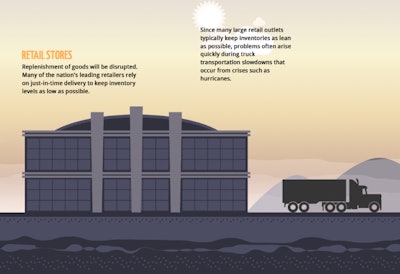 Want to see the “Truckpocalypse!” infographic? Go to ccjdigital.com/truckpocalypse to learn more.
Want to see the “Truckpocalypse!” infographic? Go to ccjdigital.com/truckpocalypse to learn more.Have you heard the one about the Truckers to Shut Down America? The group – which emerged on Facebook last month – is organizing truckers to stop hauling freight and instead roll through Washington, D.C. for three days in October to shut down the Capitol in a demonstration designed to “stop the corruption against the Constitution.” The group’s grievances range from outrage against Obamacare to displeasure with U.S. Attorney General Eric Holder, among others. Last on the list – “but not least,” according to the group’s statement – is fuel prices.
It’s hard to tell how organized the group is, but it’s doubtful this latest grass-roots effort will have any significant impact on freight movement or fuel prices.
The last time an organized truck strike occurred was in April 2008 as a protest against high fuel prices when diesel spiked above the $4-per-gallon threshold. Don’t remember it? That’s not surprising because the outcome of the strikes was essentially nothing.
But the strike was a nuisance to some. During that demonstration, truckers grouped together in convoys in highly congested areas such as Atlanta, Chicago and the New Jersey Turnpike, slowing down to cause severe traffic delays. Other groups parked in protest in Texas and at the Port of Tampa in Florida.
Truckers also organized a string of truck strikes in the 1970s, also aimed at lowering fuel prices. Alas, their efforts were in vain, and the strike did nothing to impact prices at the pump. If history repeats itself, this latest uproar is once again much ado about nothing.
But it does raise the question: What impact would it have on the U.S. economy if a truck strike was successful in shutting down a metropolitan area? Or even the country?
CCJ publisher Randall-Reilly explored a scenario whereby the trucking industry was disrupted in an infographic titled “Truckpocalypse!”, which used data from the American Trucking Associations outlining the crucial role trucking plays in our economy. It asks the question, “What happens if America’s trucks stop moving?”
In this scenario, the first dominos to fall would be severe fuel shortages and delays in just-in-time manufacturing processes, which would happen in a matter of hours. By 24 hours, hospitals and nursing homes would run short of needed medical supplies, and manufacturing would largely shut down due to lack of raw materials, putting hundreds of thousands out of work.
In a matter of a few days, grocery stores would run out of food, and uncollected garbage would begin deteriorating, posing significant public health risks. The banking system would come to a standstill, and gas stations would run completely out of fuel.
Soon after, emergency vehicles and the airline industry would be rendered inoperable without necessary fuel, and drinking water could run dry after a few weeks.
It is hard to overstate the importance of trucking in our nation’s economy, but we don’t need these ill-devised strikes to try and prove that point. If the Truckers to Shut Down America is successful at anything, it likely only will be to inconvenience motorists in the metro D.C. area and to give trucking yet another black eye in the court of public opinion. And that is not an endeavor worth pursuing.










